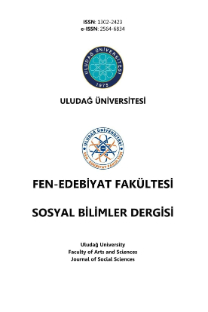Descartes’da görü, muhakeme ve metot: aklın idaresi için kurallar ekseninde bir çözümleme
Intuition, deduction and method in descartes: An analysis in the context of rules for the direction of the mind
___
- Aczel D. Amir (2005), Descartes’ Secret Notebook: A True Tale of Mathematics, Mysticism, and the Quest to Understand the Universe, Broadway Books, New York.
- Bellman Hal (2003), Büyük Çekişmeler, çev. Fusun Baytok, Tübitak Popüler Bilim Kitapları.
- Cottingham John (1998), “Introduction”, Descartes, ed. by. John Cottingham, Oxford University Press
- Damasio R. Antonio (2006), Descartes’ın Yanılgısı, çev. Bahar Atlamaz, İstanbul, Varlık Bilim.
- Descartes Rene (1985), The Philosophical Writings of Descartes, Volume I, translated by J. Cottingham, R. Stoothoff, D. Murdoch, Cambridge University Press.
- Descartes Rene (1984), The Philosophical Writings of Descartes, Volume II, translated by J. Cottingham, R. Stoothoff, D. Murdoch, Cambridge University Press.
- Descartes Rene (1991), The Philosophical Writings of Descartes, Volume III, translated by J. Cottingham, R. Stoothoff, D. Murdoch, USA, Cambirdge University Press.
- Descartes Rene (1989), Aklın İdaresi İçin Kurallar, çev. Mehmet Karasan, İstanbul, Milli Eğitim Basımevi.
- Descartes Rene (1997), Felsefenin İlkeleri, çev. Mehmet Karasan, İstanbul, Milli Eğitim Basımevi.
- Descartes Rene (2007), Tanrı’nın Varlığının ve İnsanın Ruhuyla Bedeni Arasındaki Gerçek Ayrımın Açık Biçimde Kanıtlandığı İlk Felsefe Hakkında Meditasyonlar, çev. İsmet Birkan, Ankara, Bilge Su yayıncılık.
- Garber Daniel (1988), “Descartes and Method in 1637”, PSA: Proceedings of the Biennial Meeting of the Philosophy of Science Association, Vol. 1988, Volume Two: Symposia and Invited Papers, pp. 225-236.
- Hatfield Gary (2003), Routledge Philosophy Guidebook to Descartes and the Meditations, Routledge.
- Markie Peter (1997), “Cogito ve Önemi”, çev. Alp Tümertekin, Cogito, Sayı:10, ss. 213-236.
- Murdoch Dugald (1985), “Rules for the Direction of the Mind – Translator’s Preface”, The Philosophical Writings of Descartes, Volume I, translated by J. Cottingham, R. Stoothoff, D. Murdoch, pp. 7-8, Cambridge University Press.
- Mursell James (1919), “The Function of Intuition in Descartes’ Philosophy of Science”, The Philosophical Review, Vol. 28, No. 4 (Jul., 1919), pp. 391-409.
- Schacht Richard (1984), Classical Modern Philosophers: Descartes to Kant, London, Routledge & Kegan Paul.
- ISSN: 1302-2423
- Yayın Aralığı: 2
- Başlangıç: 1999
- Yayıncı: Bursa Uludağ Üniversitesi
XIX. Yüzyılda bursa’da tiyatro faaliyetleri ve bursa gazetesinde bazı tiyatro haberleri
Giritli mübadillerin ipekçilik deneyimleri ve bunun bursa yöresine aktarılması
1837-1923 Sürecinde bursa’da ipekçilik sektörünün sosyo-ekonomik analiz
Bursa balkan göçmenleri ağızlarında isim işletme ekleri
MUSTAFA ULUOCAK, ŞÜKRÜ BAŞTÜRK, EROL OGUR, SÜLEYMAN EROĞLU, HATİCE ŞAHİN
Descartes’da görü, muhakeme ve metot: aklın idaresi için kurallar ekseninde bir çözümleme
1908-1923 Sürecinde Bursa’da koza üreticiliği ve ipekli dokumacılık sektörü
Bir kültür tarihçisi olarak ali emiri efendi’nin biyografi yazarlığı – kaynakları ve yöntemi –
1837-1908 Sürecinde bursa’da koza üreticiliği ve ipekli dokumacılık sektörü
